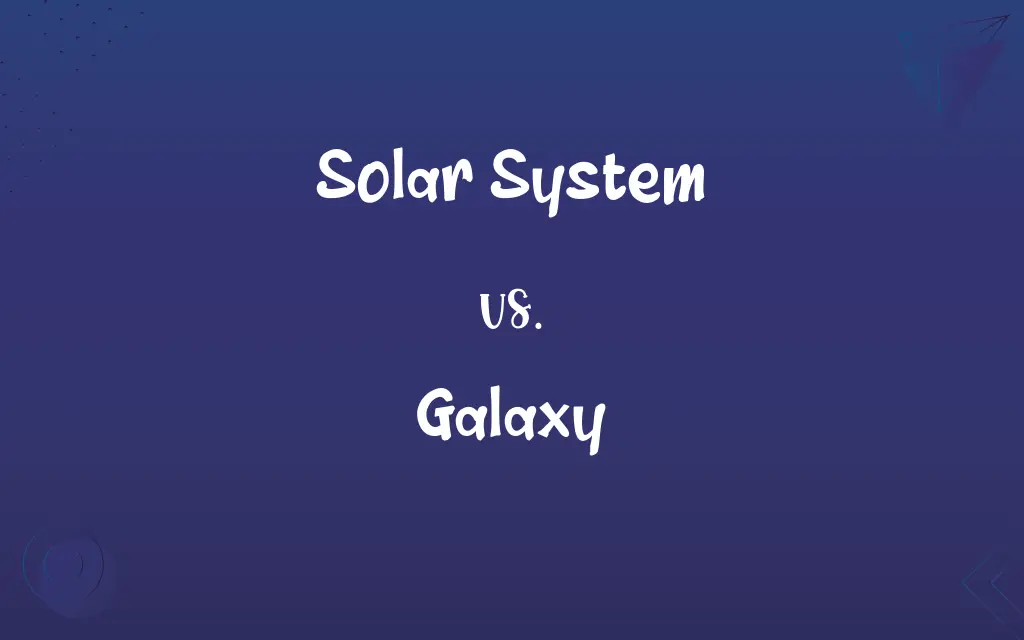Solar System vs. Galaxy: Know the Difference

By Shumaila Saeed || Updated on December 25, 2023
The Solar System is a collection of planets and other celestial bodies orbiting our Sun, while a Galaxy is a massive system of stars, stellar remnants, gas, and dust, bound together by gravity.

Key Differences
A Solar System consists of a star and the objects bound to it by gravity, including planets, moons, and asteroids. A Galaxy, on the other hand, is a vast collection of stars, planets, gas, and dust.
Shumaila Saeed
Dec 17, 2023
The Solar System is just one of many systems within a Galaxy, which contains billions of such systems. While our Solar System orbits around the Sun, a Galaxy rotates around a central point, often a supermassive black hole.
Shumaila Saeed
Dec 17, 2023
In scale, a Solar System is much smaller compared to a Galaxy. Our Solar System is part of the Milky Way Galaxy, which is vast enough to contain billions of solar systems.
Shumaila Saeed
Dec 17, 2023
The Solar System is a relatively isolated system with a known number of planets and objects. A Galaxy encompasses a variety of solar systems, nebulae, star clusters, and more, often with unknown full extents.
Shumaila Saeed
Dec 17, 2023
The age of a Solar System can be different from the age of the Galaxy it resides in. Our Solar System is about 4.6 billion years old, whereas the Milky Way Galaxy is estimated to be about 13.6 billion years old.
Shumaila Saeed
Dec 17, 2023
ADVERTISEMENT
Comparison Chart
Components
Planets, moons, asteroids, comets, the Sun
Stars, planetary systems, gas, dust, black holes
Shumaila Saeed
Dec 17, 2023
Scale
Millions of kilometers in diameter
Thousands to hundreds of thousands of light-years
Shumaila Saeed
Dec 17, 2023
Example
Our Solar System, with Earth, Mars, Jupiter, etc.
The Milky Way, Andromeda, Triangulum Galaxy
Shumaila Saeed
Dec 17, 2023
Role in the Universe
Part of a galaxy
Contains multiple solar systems and other celestial bodies
Shumaila Saeed
Dec 17, 2023
ADVERTISEMENT
Solar System and Galaxy Definitions
Solar System
The region of space under the influence of a star's gravity.
Comets from the outer Solar System often have elongated orbits.
Shumaila Saeed
Dec 12, 2023
Galaxy
A massive, gravitationally bound system of stars, gas, and dust.
The Milky Way is the galaxy that contains our Solar System.
Shumaila Saeed
Dec 12, 2023
Solar System
The family of the Sun, including all its planetary and smaller bodies.
The exploration of the Solar System helps us understand our place in the universe.
Shumaila Saeed
Dec 12, 2023
Galaxy
An astronomical entity containing billions of stars.
Scientists study distant galaxies to understand the universe's evolution.
Shumaila Saeed
Dec 12, 2023
Solar System
A collection of planets, moons, asteroids, and comets around a star.
Jupiter is the largest planet in our Solar System.
Shumaila Saeed
Dec 12, 2023
ADVERTISEMENT
Galaxy
A large-scale structure of stars and cosmic matter.
Galaxies can be spiral, elliptical, or irregular in shape.
Shumaila Saeed
Dec 12, 2023
Solar System
A star and the celestial bodies gravitationally bound to it.
The Solar System includes eight planets orbiting the Sun.
Shumaila Saeed
Dec 12, 2023
Galaxy
A collection of stellar systems, nebulae, and interstellar medium.
Andromeda is a neighboring galaxy to the Milky Way.
Shumaila Saeed
Dec 12, 2023
Solar System
The area dominated by a star, including its planetary system.
The asteroid belt is a region within our Solar System.
Shumaila Saeed
Dec 12, 2023
Galaxy
A vast assembly of star systems, potentially with a black hole at its center.
The center of our galaxy is thought to contain a supermassive black hole.
Shumaila Saeed
Dec 12, 2023
Galaxy
Any of numerous large-scale aggregates of stars, gas, and dust that constitute the universe, containing an average of 100 billion (1011) solar masses and ranging in diameter from 1,500 to 300,000 light-years.
Shumaila Saeed
Dec 08, 2023
Galaxy
An assembly of brilliant, glamorous, or distinguished persons or things
A galaxy of theatrical performers.
Shumaila Saeed
Dec 08, 2023
Galaxy
The Milky Way; the apparent band of concentrated stars which appears in the night sky over earth.
Shumaila Saeed
Dec 08, 2023
Galaxy
(galaxy) Any of the collections of many millions or billions of stars, galactic dust, black holes, etc. existing as independent and coherent systems, of which there are billions in the known universe.
Shumaila Saeed
Dec 08, 2023
Galaxy
(figuratively) An assemblage of things or people seen as luminous or brilliant.
Shumaila Saeed
Dec 08, 2023
Galaxy
Any print or pattern reminiscent of a galaxy, generally consisting of blending, semiopaque patches of vibrant color on a dark background.
Shumaila Saeed
Dec 08, 2023
Galaxy
The Milky Way, that luminous tract, or belt, which is seen at night stretching across the heavens, and which is composed of innumerable stars, so distant and blended as to be distinguishable only with the telescope.
Shumaila Saeed
Dec 08, 2023
Galaxy
A very large collection of stars comparable in size to the Milky Way system, held together by gravitational force and separated from other such star systems by large distances of mostly empty space. Galaxies vary widely in shape and size, the most common nearby galaxies being over 70,000 light years in diameter and separated from each other by even larger distances. The number of stars in one galaxy varies, and may extend into the hundreds of billions.
Shumaila Saeed
Dec 08, 2023
Galaxy
A splendid or impressive assemblage of persons or things; as, a galaxy of movie stars.
Shumaila Saeed
Dec 08, 2023
Galaxy
Tufted evergreen perennial herb having spikes of tiny white flowers and glossy green round to heart-shaped leaves that become coppery to maroon or purplish in fall
Shumaila Saeed
Dec 08, 2023
Galaxy
(astronomy) a collection of star systems; any of the billions of systems each having many stars and nebulae and dust;
`extragalactic nebula' is a former name for `galaxy'
Shumaila Saeed
Dec 08, 2023
Repeatedly Asked Queries
What is the largest type of galaxy?
The largest type of galaxy is typically an elliptical galaxy.
Shumaila Saeed
Dec 17, 2023
Can galaxies collide?
Yes, galaxies, including the Milky Way, can and do collide over time.
Shumaila Saeed
Dec 17, 2023
What is the Solar System?
The Solar System is a group of celestial bodies, including planets, orbiting our Sun.
Shumaila Saeed
Dec 17, 2023
How many galaxies are in the universe?
There are estimated to be over two trillion galaxies in the observable universe.
Shumaila Saeed
Dec 17, 2023
Is our Solar System the only one in the Milky Way?
No, the Milky Way contains billions of solar systems.
Shumaila Saeed
Dec 17, 2023
Can we travel to other galaxies?
With current technology, traveling to other galaxies is not feasible.
Shumaila Saeed
Dec 17, 2023
Does every star have a Solar System?
Not every star has planets or a Solar System, but many do.
Shumaila Saeed
Dec 17, 2023
What defines a Galaxy?
A Galaxy is a massive system of stars, gas, and dust, bound together by gravity.
Shumaila Saeed
Dec 17, 2023
How many planets are in our Solar System?
There are eight planets in our Solar System.
Shumaila Saeed
Dec 17, 2023
What is the largest planet in our Solar System?
Jupiter is the largest planet in our Solar System.
Shumaila Saeed
Dec 17, 2023
What is at the center of our Solar System?
The Sun, a star, is at the center of our Solar System.
Shumaila Saeed
Dec 17, 2023
What is the Kuiper Belt?
The Kuiper Belt is a region of the Solar System beyond Neptune, filled with icy bodies.
Shumaila Saeed
Dec 17, 2023
How is the age of a Solar System determined?
The age is determined by dating the oldest rocks and meteorites in the system.
Shumaila Saeed
Dec 17, 2023
What is a spiral galaxy?
A spiral galaxy has a central bulge surrounded by spiral arms, like the Milky Way.
Shumaila Saeed
Dec 17, 2023
Do all Solar Systems have planets like Earth?
Not all Solar Systems have planets like Earth; planetary systems vary greatly.
Shumaila Saeed
Dec 17, 2023
What is at the center of most galaxies?
Most galaxies have a supermassive black hole at their center.
Shumaila Saeed
Dec 17, 2023
Can galaxies be different colors?
Yes, galaxies can appear different colors based on the age and type of their stars.
Shumaila Saeed
Dec 17, 2023
What is an elliptical galaxy?
An elliptical galaxy is a type of galaxy that is spherical or ellipsoidal in shape.
Shumaila Saeed
Dec 17, 2023
Are new galaxies still forming?
Yes, galaxy formation is an ongoing process in the universe.
Shumaila Saeed
Dec 17, 2023
Is Pluto still considered a planet in our Solar System?
No, Pluto was reclassified as a dwarf planet in 2006.
Shumaila Saeed
Dec 17, 2023
Share this page
Link for your blog / website
HTML
Link to share via messenger
About Author
Written by
Shumaila SaeedShumaila Saeed, an expert content creator with 6 years of experience, specializes in distilling complex topics into easily digestible comparisons, shining a light on the nuances that both inform and educate readers with clarity and accuracy.









































































